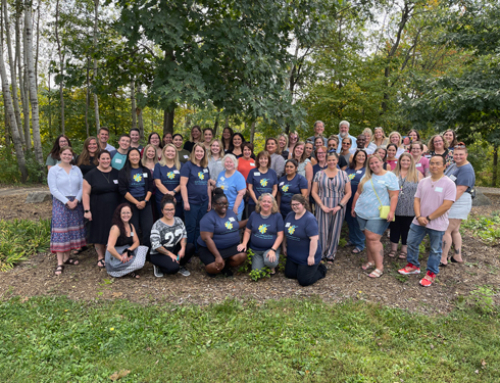by Jennifer Krekelberg
Supervisor, Dakota Healthy Families
Their pregnancy was unexpected. Maria and Alex were not sure they would still be together if not for the birth of their baby girl, but they were willing to try. Both worried they might not be good parents to Emma, so when offered services through 360 Communities Dakota Healthy Families program, they decided to participate.
Jennifer, a home visitor with 360 Communities, met Maria and Emma in their home when Emma was just 6 days old. She introduced the program curriculum they would be using to learn about Emma’s development and parent-child attachment principles. Maria appreciated the information because she was worried about emotionally attaching to her baby. She shared that she had a difficult labor and delivery, that Alex had been very supportive, but that after the delivery she had been crying frequently, and that breastfeeding had been challenging. Maria was glad to be able to ask Jennifer questions because she didn’t have anyone in her life offering support to her in that way.
During the first visit, Jennifer spoke about postpartum depression and anxiety and explained the symptoms of perinatal mood and anxiety disorders. Jennifer told Maria how important it was that she would not be alone in her experiences and that symptoms respond well to treatment. Maria had wondered about postpartum, and with new information felt prepared. Each week Jennifer checked in with Maria and Alex at their home visit regarding the symptoms they were feeling. According to the Academy of Pediatrics, 80 percent of new mothers experience the “baby blues.”
Six weeks after Emma’s birth, Maria returned to a very stressful job and began to experience even more anxiety and depression. Jennifer connected Maria to a psychiatrist, a therapist, and a support group. She also continued to emphasize the importance of self-care strategies. Even with this help and a supportive parenting partner, Maria continued to feel anxiety in caring for Emma. She reached the point where she was unable to go any place with her alone and was diagnosed with postpartum depression.
According to the American Academy of Pediatrics, up to 25 percent of women experience significant symptoms of depression or anxiety during pregnancy and after childbirth.
“After the diagnosis, I felt alone and ashamed and powerless,” Maria said, “Jenny came for a visit and I told her about the diagnosis and I began crying. I said I was sorry – I was afraid of telling her because I didn’t know what she would think. Was I a bad mother? Would she report me for having postpartum depression?” She said Jennifer stopped the activity they were doing and said, “Let’s talk about this.” Maria recalled that Jennifer helped her give voice to her feelings and worked with her depression and anxiety throughout their entire four years together in the program.
Dakota Healthy Families strives to involve fathers because they have a crucial role in the life of their child. We know that many dads also struggle with postpartum depression. According to multiple studies, men whose partners are having postpartum depression have a 2.5 times higher risk to be depressed themselves. Jennifer shared that she would be flexible with visits and could meet after Alex got off work so that he could participate in the program as well. Jennifer shared with Alex the signs and symptoms of postpartum depression, and how therapy, medication, and self-care are important for physical and mental wellness.
In many ways, Maria and Alex’s story illustrates why Dakota Healthy Families is critical. It provided information on how to provide a child with early learning, ways to build social and emotional intelligence, and activities to use that promote a positive relationship between child and parent. Dakota Healthy Families is able to support and empower parents’ dreams for their child during a time when they naturally reflect on their own childhood and consider what they want life to be like for their child, and what kind of parent they want to be.
The program’s curriculum is set up to build parents’ confidence by recognizing their strengths. It provides families the opportunity to identify and cultivate their own family values. Jennifer worked with Alex and Maria to lay out purposefully what they wanted for Emma. She was critical in helping them identify what they could do to achieve these things at each stage in development over the four years they participated in the program. Both Maria and Alex see how Emma has grown into a secure, social and curious little girl. They take pride in the work it took as a family unit to respond to her needs and build her confidence.
“It’s easy to say that you are going to put the child first,” said Alex, “but putting those words into practice is incredibly difficult. It took time, it took patience, and it took interventions like Dakota Healthy Families. We’re fortunate because when people see Emma, they see a happy, healthy child who is doing great things.”
“At graduation from the program, I was tearful because it was a lot of hard work and I was so proud,” said Maria, “and I was confident as a mother. That’s coming from someone who started with zero confidence.”
This success story is another example of how 360 Communities staff work alongside families to reinforce and build on their innate strengths to help them reach their potential, regardless of their unique circumstances. Having a baby is often portrayed as a purely wonderful, magical time where everyone feels happy and excited. However, parenting is also a transitional and emotional experience that can be overwhelming. Many families have significant stresses in their life. 360 Communities Dakota Healthy Families does essential work to promote safe, healthy and nurturing homes for children and prepare them for kindergarten.





